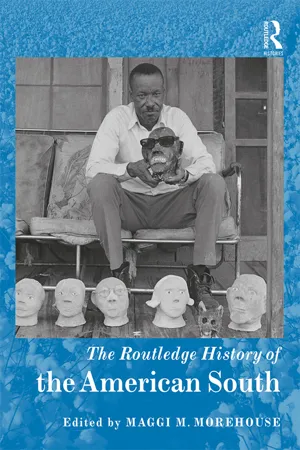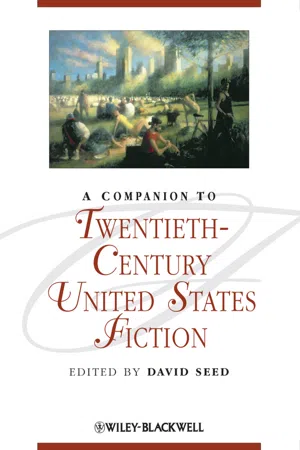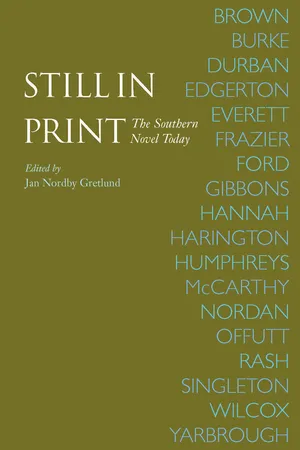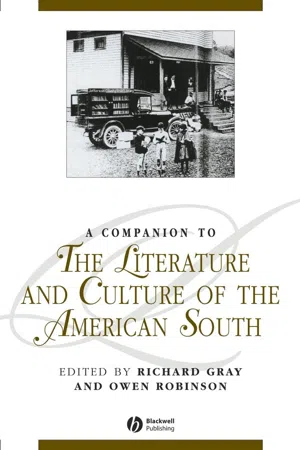Literature
Southern Fiction
Southern Fiction is a genre of literature that focuses on the American South, its culture, and its people. It often explores themes of race, class, and gender, and is known for its use of dialect and regionalism. Prominent Southern Fiction writers include William Faulkner, Flannery O'Connor, and Eudora Welty.
Written by Perlego with AI-assistance
Related key terms
1 of 5
5 Key excerpts on "Southern Fiction"
- eBook - ePub
- Maggi Morehouse, Maggi M. Morehouse(Authors)
- 2017(Publication Date)
- Taylor & Francis(Publisher)
14Southern LiteratureTaylor HagoodIt goes without saying that it is impossible to gain the fullest possible understanding of the American South without knowing its literature. The region’s writing is rich, and it provides vital ways of understanding the South and its many contradictions. This chapter therefore considers the characteristics of southern literature—in fiction, poetry, drama, and nonfiction—along with a survey of its major works.Before delving into the details of this literary history, it is useful to provide comments about some of the features that define southern literature. One of these is a tendency to employ certain character, narrative, and setting types. Society is and has been fluid and complex throughout southern history, and many different kinds of places, with distinct histories, economics, and political situations, make up the South. Yet southern literature has generally worked within a powerful typology that readers have often assumed to be accurate markers of society. The range of these types is wide and varied according to the historical moment. Prominent types include the following: character types such as the southern belle, the mammy, and the poor white mountain man; landscape types such as cotton fields, swamps, and southern mountain cabins; dialects such as black, white trash, and Cajun; and class distinctions between poor whites and blacks, so-called yeomen farmers, and white aristocrats.As is the case with most types, there are elements of truth within them individually and in relation to one another, but they more often than not more readily serve artistic purposes. This is not to say that writing located in other parts of the United States does not employ types but rather that those of southern literary history have assumed especial power that serves important psychological and cultural purposes both for the South and for the country as a whole. Described as the “nation’s other” by scholar Leigh Anne Duck, the South can often be seen as the evil, rotten, poor, uneducated netherworld with a past of slavery, racism, and religious backwardness in a country that otherwise thinks of itself as successful, progressive, and freedom-loving. The types of the South operate strongly within this machinery, and writers are obliged to grapple with them. Indeed, while much contemporary writing achieves a more richly complex and often realistic representation and engagement with the South, there remains a strong tendency to work within the shorthand of southern typology, even if to do so only for ironic purposes, most clearly in what has been called postsouthern writing, which will be discussed toward the end of this chapter. - David Seed(Author)
- 2010(Publication Date)
- Wiley-Blackwell(Publisher)
The region’s biracial yet supposedly monocultural literary tradition functioned for much of the twentieth century to set it apart from a more ethnically diverse “American” fiction, but, as collections such as Jon Smith and Deborah Cohn’s Look Away! The U.S. South in New World Studies (2004), and articles by Martyn Bone and others begin to explore, the region has a multicultural history and future. Jack Butler’s reminder that Southern writers are the coastline that maps the region’s shifting borders is exciting when that coastline is continually showing “finer and crazier variation” (Butler: 34). However, when Hurricane Katrina struck in 2005 the devastation of the Gulf Coast was a reminder that the U.S. South remained sym- bolically estranged from the nation but inextricably bound into ideas of nationhood. In confronting the U.S. government with issues of poverty and racism that could no longer be hidden, this “local” and “regional” disaster exposed a larger national crisis in political, fiscal, and racial terms. Even if Southern Fiction’s narrative glue has been place and family, the simultaneous vilification and reification of the South has under- pinned the regional narrative. It has always rested on the nation’s history and the region’s relationship to that history. Southern Fiction is instrumental in depicting those issues that have been central to the national narrative, especially race and rights. The fictions that have begun to explore the aftermath of Hurricane Katrina will con- tribute to that same creative body of knowledge. References and Further Reading Baldwin, James (1964). The Fire Next Time [1963]. Harmondsworth: Penguin. Betts, Doris (1993). “Daughters, Southerners, and Daisy,” in The Female Tradition in Southern Litera- ture, ed. Carol Manning, pp. 259–76. Urbana, I.L.: University of Illinois Press. Bone, Martyn (2005). The Postsouthern Sense of Place in Contemporary Fiction.- eBook - ePub
Still in Print
The Southern Novel Today
- Jan Nordby Gretlund(Author)
- 2013(Publication Date)
- University of South Carolina Press(Publisher)
and on the author’s involvement in her own fiction. To what extent, we ask, does the writer’s life translate into fiction? If we are honest, we must admit that we ask this question frequently. As contributing critics to this collection, we have feared getting lost in the southern writers’ interesting biographical backgrounds, so while the essays focus on one novel each, we have supplied a separate biographical sketch for each writer, and the main focus remains on the reading of one novel. We also include extensive bibliographies for those who want to read more fiction by an author or want to read more about the author.Writers of highly divergent styles, techniques, and theoretical approaches seem to share an understanding of literature that confirms its traditional function and status in society, even in the everyday world of local communities. In general the contemporary southern novel is not a literature that reflects a modern feeling of homelessness and alienation, which does not mean that it offers characters wholly without problems—on the contrary. But the point is that it is a literature that does not try to separate itself from the southern context from which it emerges.The interactions between the individual and the collective spheres remain crucial. Let us, as an aside, look at the ideas of “the family of man” and “the global village,” which are still popular. But should they be? Not from a Jeffersonian point of view. The ideas offer no acceptable excuse for not knowing anything about where you are, the people who live and lived here, and what happened in their lives. We need to note that the most important element in the expression “the family of man” is the word “man,” as in “mankind.” The southern novel of today reminds us that the individual human being is always more important than anything as vague as “an idea.” You have to be a member of a family, a particular concrete family—if you are not, create one as people do, also in Southern Fiction—then, and only then, you can try to be a part of something as abstract as “the family of man.” In a similar way for a southerner the important element of the Emersonian expression “the global village” is the word “village.” First you must belong to a village, be a part of a community—a local community, because all ideas and art, all history and literature, has its origin in a particular community. If you are of the village, then, and only then, can you be a member of anything as abstract and undemanding as “the global village” and other transcendental structures of meaning. The humorous fiction of Singleton, Edgerton, Wilcox, Harington, and Nordan show how the clichés function as distractions from the realities and needs of daily life, and that if they are not validated in the particular life in the community, the clichés remain just that. If we do not get to know the village and its individual members, any talk of the family of man and the global village is just a mental exercise. The novelists make sure we get to know that their characters are surrounded by their southern families and are totally engulfed in their communities. - eBook - PDF
- John T. Matthews(Author)
- 2015(Publication Date)
- Cambridge University Press(Publisher)
Genres Fictions of the plantation chapter 15 “Truth so mazed” Faulkner and US plantation fiction Peter Schmidt Reading Faulkner in historical context means resisting the temptation to believe his art is “selfprogenitive,” a key concept stressed in Go Down, Moses’ “The Bear.” Any consideration of Faulkner’s literary influences must include antebellum and early New South plantation fiction. Before the Civil War, representations of pastoral economies and harmony among the races played a central role in the Southern counter-attack against Harriet Beecher Stowe’s Uncle Tom’s Cabin (1852), the most influential fictional indictment of slavery as a threat to the economic and moral fabric of the United States. After the War, during the era of Jim Crow at home and US colonialism abroad, influential new narratives set on plantations by Southern writers appeared to great acclaim in national magazines like Scribner’s and Harper’s. The Civil Rights era in the mid-twentieth century eventually transformed our understanding of both Faulkner and plantation fiction – most notably via new interpretive strategies inspired by black studies, feminist criticism, postcolonial theory, and the “global South” turn in US studies. Broadly speaking, the appeal of Southern plantation fiction was once primarily understood as an expression of nostalgia for a pre-modern, rural, and regional past in both economic and social relations, a Southern variant of dialect stories and rural realism that became known in the late nineteenth century as “local color.” Since the 1980s, though, plantation fiction and local color writing have been interpreted as helping to create literary modernity, 1 just as colonial/plantation economies were essential to the new wealth of cities. Plantation fiction romances were also powerfully recuperative for post-Civil War audiences. - Richard Gray, Owen Robinson, Richard Gray, Owen Robinson(Authors)
- 2008(Publication Date)
- Wiley-Blackwell(Publisher)
Recent and Contemporary Women Writers 541 The history of Southern race relations has proved a compelling if difficult subject both for established novelists like Douglas and Elizabeth Spencer and new voices like Devoto and McLarey. It remains a source of drama and quiet meditation. Most recently, Melanie Neilson writes a mystery in which the internecine history of race relations skews love and preempts murder in a first novel following her acclaimed memoir Even Mississippi . However, The Persia Cafe ´ (2001) is also a lyrical story firmly embedded in Southern folkways and foodways; Fannie Leary, Neilson’s protagonist, is a cook who informs us that the story she tells ‘‘begins in my nose.’’ It unfolds slowly in a small Mississippi River town, and in its emphasis on the pervasiveness of regret and the impossibility of forgiveness owes much to the ‘‘dark fable’’ of Southern literary history, in which racism disrupts even the smallest and most harmonious of Southern communities. Replacing the South From Ellen Glasgow and Eudora Welty to Alice Walker and Ellen Douglas, a sense of place has proved a resonant feature of fiction. Josephine Humphreys asserts ‘‘Fiction must take place ’’ and in Rich in Love (1987) two characters take a tour of Charleston, the city in which they have grown up and which they still call home. They experience what has come to be recognized as heritage tourism (‘‘the smell of bus fuel had become the dominant smell of the city’’) as they take in Fort Sumter, Boone Hall Plantation, and the Old Slave Mart Museum. One character, Rhody, disguises herself before joining the tourists in order to gain a different perspective on the South she knows so well, otherwise ‘‘You get in your way.’’ One way of expanding tropes of one’s region is through deterritorialization, as Deleuze and Guattari describe it in On the Line (1983).
Index pages curate the most relevant extracts from our library of academic textbooks. They’ve been created using an in-house natural language model (NLM), each adding context and meaning to key research topics.




